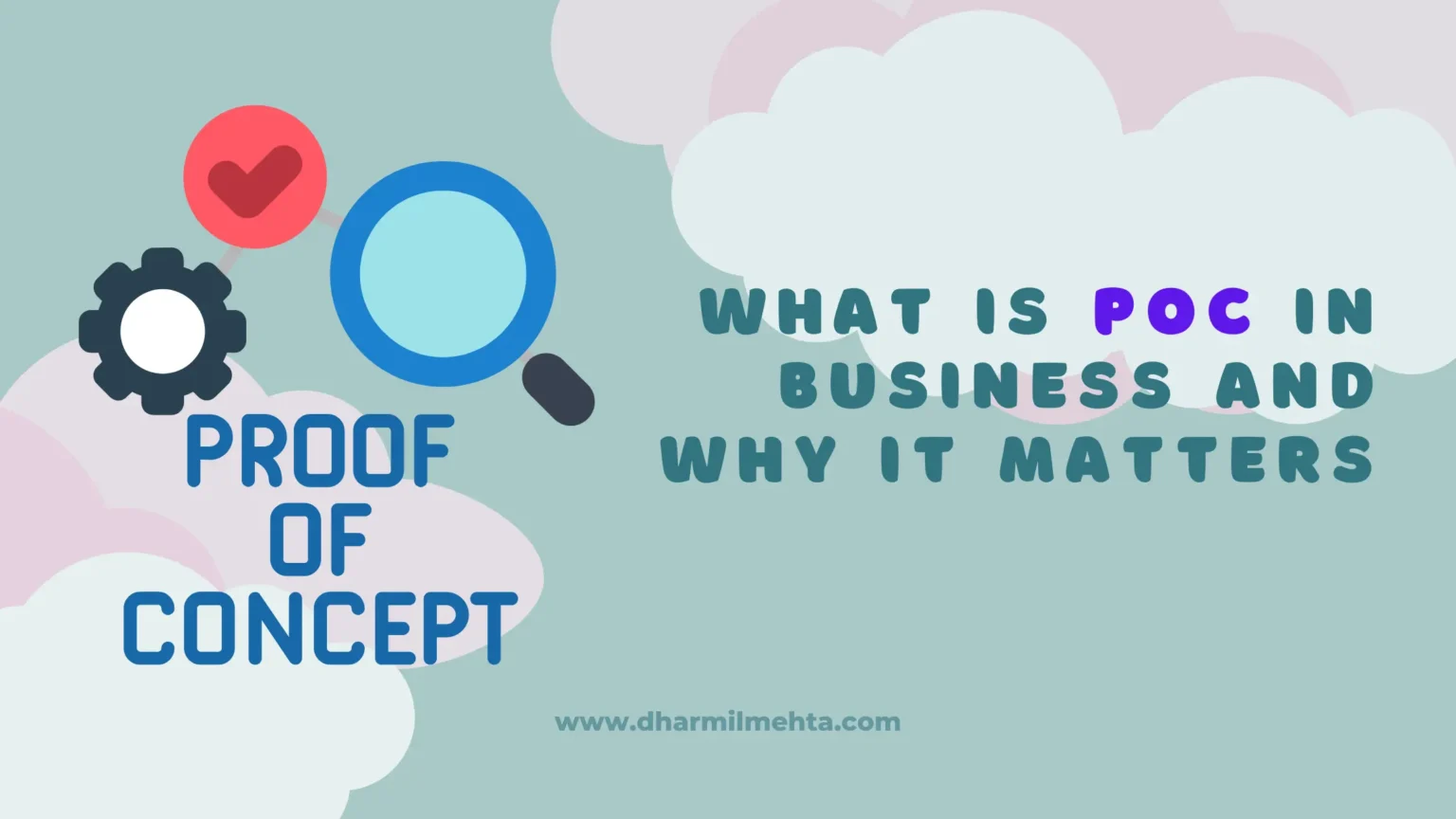In the fast-evolving world of business, the race to innovate is relentless. Every day, new ideas spark into life, but how do you know which ones will truly shine? Enter the proof of concept—the unsung hero of business strategy. If you’ve ever wondered what is POC in business, or why it’s crucial, you’re about to uncover a key to unlocking transformative potential.
Imagine having an idea that could revolutionize your industry. Yet, without testing its viability, that concept remains a mere figment of possibility. This is where the proof of concept steps in, acting as a bridge between theory and reality. It’s not just about dreaming big; it’s about ensuring those dreams are built on solid ground. The POC meaning business professionals use allows companies to experiment, minimize risks, and refine their ideas before investing time, money, and resources into full-scale development.
But let’s dig deeper into what does POC stand for in a broader sense. Beyond its basic function, a well-executed POC can serve as a powerful beacon for stakeholders. It demonstrates not only that your idea works but that it can be scaled, adapted, and embraced by the market. This ability to test the waters before diving in headfirst offers an unparalleled advantage in an increasingly competitive landscape.
Understanding the proof of concepts meaning can spell the difference between a failed initiative and a groundbreaking success. It matters because it transforms uncertainty into clarity, guesses into data-backed decisions. Whether you’re a startup seeking investment or a seasoned company rolling out a new product line, a solid POC can elevate your business to the next level.
In short, knowing what is POC in business and leveraging it effectively ensures that your ideas aren’t just ambitious—they’re achievable. So, before you set your next big idea into motion, ask yourself: does it have the backing of a strong proof of concept? If not, you may need to reconsider your strategy.
What is a Proof of Concept?
The proof of concept (POC) is a preliminary stage in the development of a product or idea that demonstrates its feasibility. At its core, a proof of concept helps answer one vital question: “Can this concept work in practice?” It’s a method used across industries, from software development to manufacturing, to test whether an idea has real-world potential. But it’s not just limited to technical validation. A proof of concept statement also helps businesses gauge the market need, resource requirements, and any potential obstacles they may face.
While the POC meaning in business may vary slightly depending on the industry, the principle remains the same—before fully investing in a project, ensure that it is achievable and practical. The proof of concept acronym is used to describe this stage of validation, and it has become an essential part of modern business strategy. Companies that skip this step risk pouring resources into ideas that may not succeed.
POC Acronym and Its Role in Business
You may be wondering, what does POC stand for? In most cases, POC stands for proof of concept, but the POC acronym can take on various meanings depending on the context. In the tech world, for instance, POC in software refers to testing whether a specific software solution can be implemented successfully in the intended environment.
Similarly, in the product development cycle, the proof of concept stage of product creation is pivotal. Before a product hits the market, businesses need to know if it works as expected. This is where proof of concept testing comes into play. Companies use this testing phase to simulate real-world scenarios and examine how the product performs. The poc meaning in software development is especially critical because bugs, functionality issues, or integration problems can be identified and fixed early on.
The POC full form in any context emphasizes its preliminary nature. Whether you’re testing software, a new product design, or a business process, the p.o.c. abbreviation signals that this is just the beginning of the validation process. What does POC mean in business? In this context, it’s about risk mitigation, resource allocation, and validating ideas before they’re fully executed.
Why is Proof of Concept Important?
A proof of concept is more than just a technical step; it’s a strategic move. When done correctly, it helps businesses save time, money, and resources. What exactly is the goal of a proof of concept? Essentially, it aims to confirm that a new idea can be translated into a viable product or solution. This is where the proof of concepts meaning becomes clear—it’s about ensuring that an investment is worth making.
For example, in IT, POC in business is used to test the viability of new technologies, such as a cloud POC. A company might want to implement cloud computing but isn’t sure whether the chosen platform will meet its needs. A cloud POC helps determine the compatibility of the cloud service with the company’s infrastructure, ensuring a smooth transition.
In product development, proof of concept testing can identify potential issues early on. Instead of launching a flawed product, companies can refine their concept based on the results of the POC. This helps businesses avoid costly mistakes and wasted efforts. Whether it’s POC software, hardware, or a new business model, the POC acts as a safeguard against failure.
Read More: What Is Ghost Commerce? 6 Powerful Benefits to Know
POC in Software Development
In the realm of software, the POC meaning in software development is crucial. When companies develop new software or apps, they need to ensure that the solution works as intended. POC software involves creating a simplified version of the software to demonstrate its core functionalities. This allows developers and stakeholders to see if the solution is feasible before moving to full-scale development.
For instance, a company developing a new app may want to test its core features before investing in the entire project. The poc of software would demonstrate whether the app’s functionality aligns with the intended user experience and technical requirements. If successful, the project moves forward with confidence. If not, adjustments can be made early in the process, saving time and resources.
What is POC in Business?
So, what is POC in business and why is it so critical? The POC meaning business professionals rely on goes beyond just technical validation. It’s about proving that an idea is not only possible but also profitable and scalable. Whether you’re working on a new product, a service, or a business model, the POC in business stage helps you understand whether it’s worth pursuing.
For businesses, proof of concept POC is a tool for making data-driven decisions. Without it, companies would be forced to rely on assumptions and predictions, which can be risky. The poc in business is particularly important in industries with high development costs, such as manufacturing, pharmaceuticals, and software development.
The Proof of Concept Process
The proof of concept process typically involves several steps:
- Idea Generation: The first step is identifying the idea or solution you want to test. This could be a new product, service, or process.
- Research and Analysis: Once the idea is defined, research is conducted to understand the market need, competition, and potential challenges. This helps refine the idea and make it more practical.
- Developing a POC: A simplified version of the idea is created, whether it’s a prototype, a demo, or a test case. This is the heart of the POC and demonstrates the feasibility of the concept.
- Proof of Concept Testing: This stage involves testing the POC in real-world scenarios. The goal is to identify any issues or limitations that need to be addressed before full-scale development.
- Analysis and Decision: After testing, the results are analyzed. If the POC proves successful, the project can move forward. If not, adjustments can be made, or the idea may be abandoned altogether.
POC Across Industries
While the POC meaning may vary from industry to industry, the underlying principle remains the same. The proof of concept is about validation, whether you’re in tech, manufacturing, or healthcare.
In the tech industry, for example, POC software helps developers test whether a new application or system can be integrated into existing platforms. In healthcare, a proof of concept might involve testing a new medical device or treatment in a controlled environment. In manufacturing, proof of concept testing can involve creating a prototype of a new product to assess its functionality and durability.
Regardless of the industry, the POC acronym business professionals use emphasizes risk management. By validating ideas before full-scale execution, companies can avoid costly mistakes and improve their chances of success.
Read More: 5 Innovative Strategies to Improve Data Annotation
Examples of POC in Business
Let’s consider a few real-world examples of POC in business. In the automotive industry, a company might develop a prototype of a new electric vehicle to test its performance and safety before committing to mass production. This POC project would involve extensive testing to ensure the vehicle meets regulatory standards and consumer expectations.
In the tech industry, POC software could involve testing a new algorithm to improve a company’s data processing capabilities. The goal would be to demonstrate that the algorithm can handle the required data volume and provide accurate results. If successful, the company can implement the algorithm on a larger scale.
In healthcare, a proof of concept might involve testing a new drug in a controlled trial to assess its effectiveness and safety. If the POC proves successful, the drug can move on to further clinical trials and, eventually, market approval.
Conclusion
In conclusion, the proof of concept is an essential part of modern business strategy. It allows companies to test the feasibility of new ideas, products, and technologies before fully committing to them. Whether it’s POC in software development, product design, or business processes, the proof of concept acronym represents a critical step in ensuring success.
Understanding what is POC in business and leveraging it effectively can help businesses innovate while minimizing risk. By validating ideas early on, companies can save time, money, and resources, ensuring that they only invest in projects that have real-world potential. In a world where innovation is key to staying competitive, the proof of concept has become more important than ever.












Your blog has quickly become one of my favorites. Your writing is both insightful and thought-provoking, and I always come away from your posts feeling inspired. Keep up the phenomenal work!